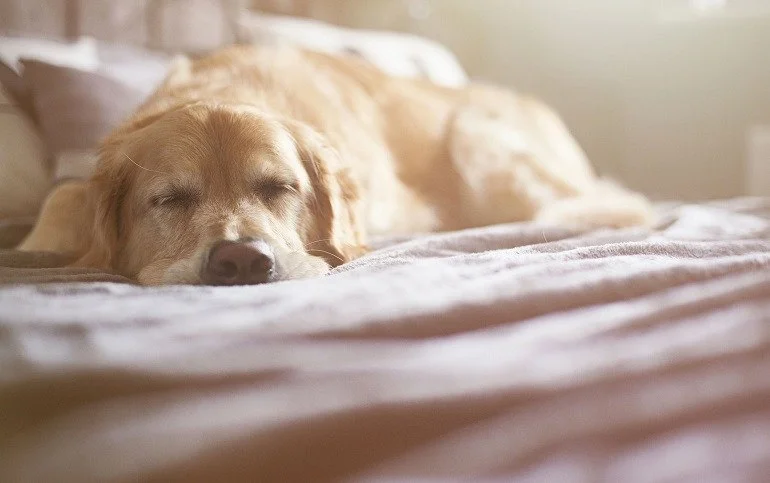Do Dogs Sleepwalk? Things That May Be Confused with Sleepwalking
by Tom Ken
As a pet parent, it is always essential to understand the potential challenges that your pup can encounter at some point in its life. Sleepwalking is one such issue, and it is more complicated for dogs than it might appear. Here we answer some of the most pertinent questions regarding sleepwalking in dogs to ensure pet parents understand the issue well.
Do Dogs Sleepwalk?

For dog owners who have been keeping these pets for a long time, chances are you have seen the canine lurch and twitch when sleeping. Some dogs even move their legs in the same motion they would when running while still asleep. Moreover, some can even gallop and pace around.
All this does not mean dogs can sleepwalk as things are not that straightforward. In most cases, it is usually a misinterpretation of the dog's sleeping behavior. Perhaps a proper understanding of what sleepwalking it should make things clearer.
What is Sleepwalking?
Sleepwalking is a disorder (behavioral) that arises when one is in a deep sleep state. It entails walking and performing other activities you would expect a fully awake person to do.
Although walking is the most common manifestation of this disorder, it is essential to note there are a variety of other complicated processes involved. Also, there are no underlying problems associated with sleepwalking for human beings, whether psychological or medical.
While adults still sleepwalk, it is most prevalent in children under 7 years that bedwet and have sleep issues like apnea. Although it often occurs during the deep sleep cycle, it can occasionally happen during the REM sleep cycle.
Things That May Be Confused with Sleepwalking

Those twitches and jerks you see your pup make as it sleeps are not always because of sleepwalking. Other disorders can manifest in the same way, such as the three below.
1. Neurological Disorders
When your pup has a neurological disorder, its brain and the nervous system might not work how they are supposed to, leading to strange behaviors during sleep. If your dog has seizures due to a neurological disorder, it may behave like it is sleepwalking when awake.
Other typical sleepwalking behaviors like pacing around and vocalization with no apparent cause are also common for dogs suffering from brain or nervous system issues.
2. Sleep Disorders
Sleepwalking is among the most prevalent sleep disorders, but it is not the only one. While dogs typically do not sleepwalk, other sleep issues like narcolepsy and insomnia can trigger unusual sleep patterns as they make the pet extremely drowsy.
The drowsiness often makes the dog appear like it is sleeping even when fully awake, and hence anything it does when in this state is often misunderstood to be sleepwalking.
3. Cognitive Disorders
Just like humans, many dogs tend to go through cognitive decline as they advance in age. One of the effects of this is wandering and acting strange or confused. All this can be easily interpreted as sleepwalking, depending on when they occur.
What Should I Do If My Dog Does Strange Things in His/Her Sleep?

If your pup does strange things when sleeping, you need to take precautions to keep it safe and comfortable. Here are few things you can do.
1. Ensure It Sleeps in a Comfortable Place: For pets that seem to find it hard to sleep or make some funny movements when sleeping, you need to make sure their sleeping area is as comfortable as possible. When the pup is comfortable, it sleeps more soundly.
2. Remove Potential Hazards: Although your pet will probably not stand and pace around in its sleep, any movement puts it at the risk of injuries. Therefore, to minimize the risk, make sure there are no things that can potentially injure the pet, such as cabinets or tables.
3. Keep the Pet Active: Keeping your pup active during the day through play and exercise can help ensure better sleep. While this might not cure neurological or sleep disorders, it promotes better sleep patterns and tires out the pup for a deeper sleep.
4. Maintain Proper Dog Diet: What the pet eats has a significant effect on how it sleeps, as diet deficiencies are a huge contributor to sleep issues. Maintaining a healthy diet with omega-3 fatty acids supplements promotes and encourages better sleep habits and patterns.
Conclusion
While dogs cannot sleepwalk, sometimes they can manifest signs of it when sleeping. In most cases, it arises from poor sleep patterns, but in others, it can result from neurological, sleeping, or cognitive disorders. Therefore, if you notice signs of sleepwalking in your pet, it is a great idea to have it checked or examined, and treated by a vet to ensure its overall wellbeing.
 |
 |
 |
 |

About Tom Ken
Tom has worked with many veterinary surgeons as a nurse at different veterinary clinics throughout his life.
There, he provides care for sick animals; such as: dogs, cats, rabbits, birds, hamsters, guinea pigs, and sometimes reptiles.
He has good work ethics and gentle hands; hence, the doctors as well the pet owners have come to love his presence alot.
With this site, he aims to help the readers ensure their pets' wellbeing, learn how to care, and proivide medical treatment as needed.
Joshua received Veterinary Technician Degree at Purdue University in West Lafayette, IN.
Thoughts on "Do Dogs Sleepwalk? Things That May Be Confused with Sleepwalking"
 |
 |
 |
 |
Pet Care Tips
You can Get FREE Gifts. Furthermore, Free Items here. Disable Ad Blocker to receive them all.
Once done, hit anything below
 |
 |
 |
 |